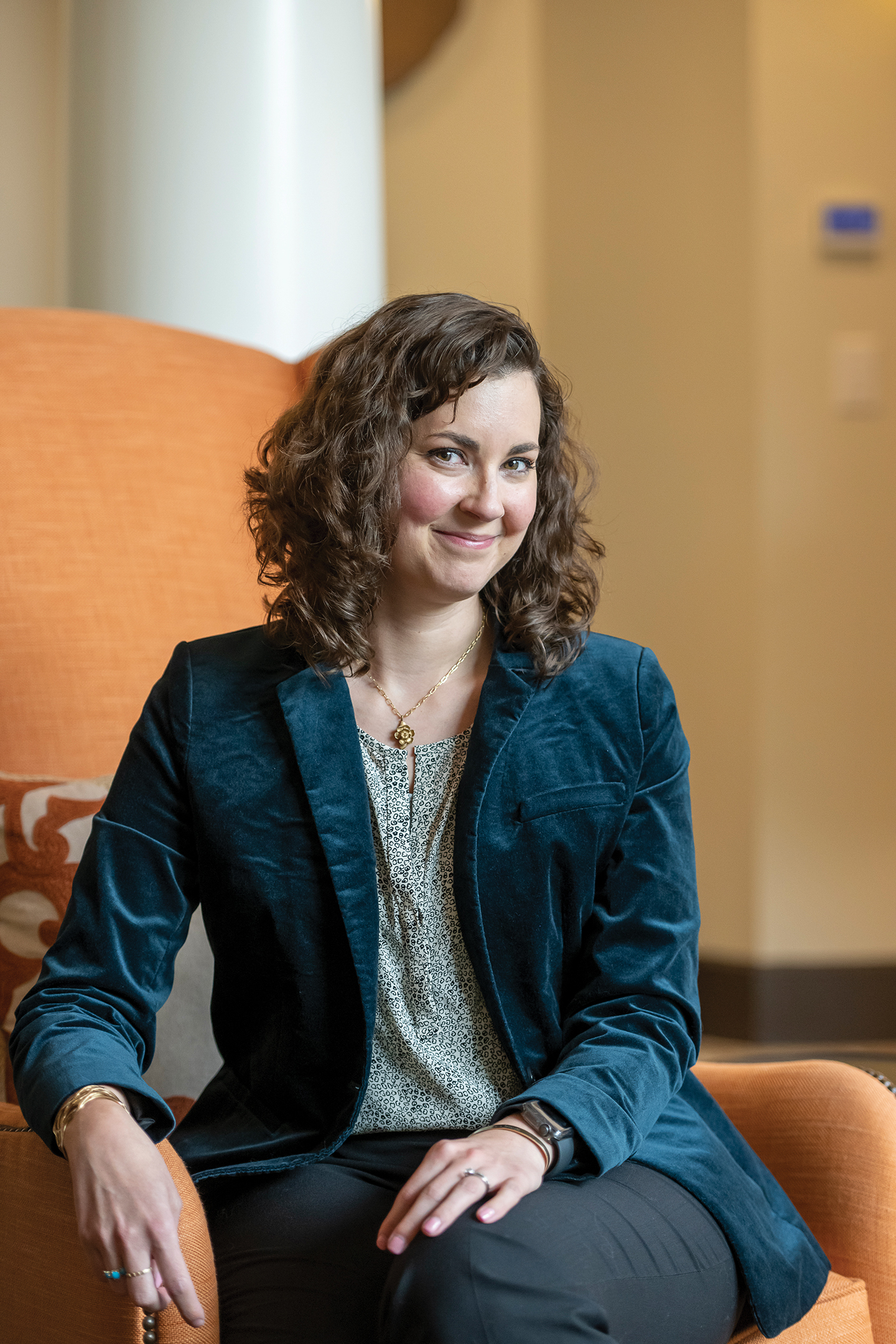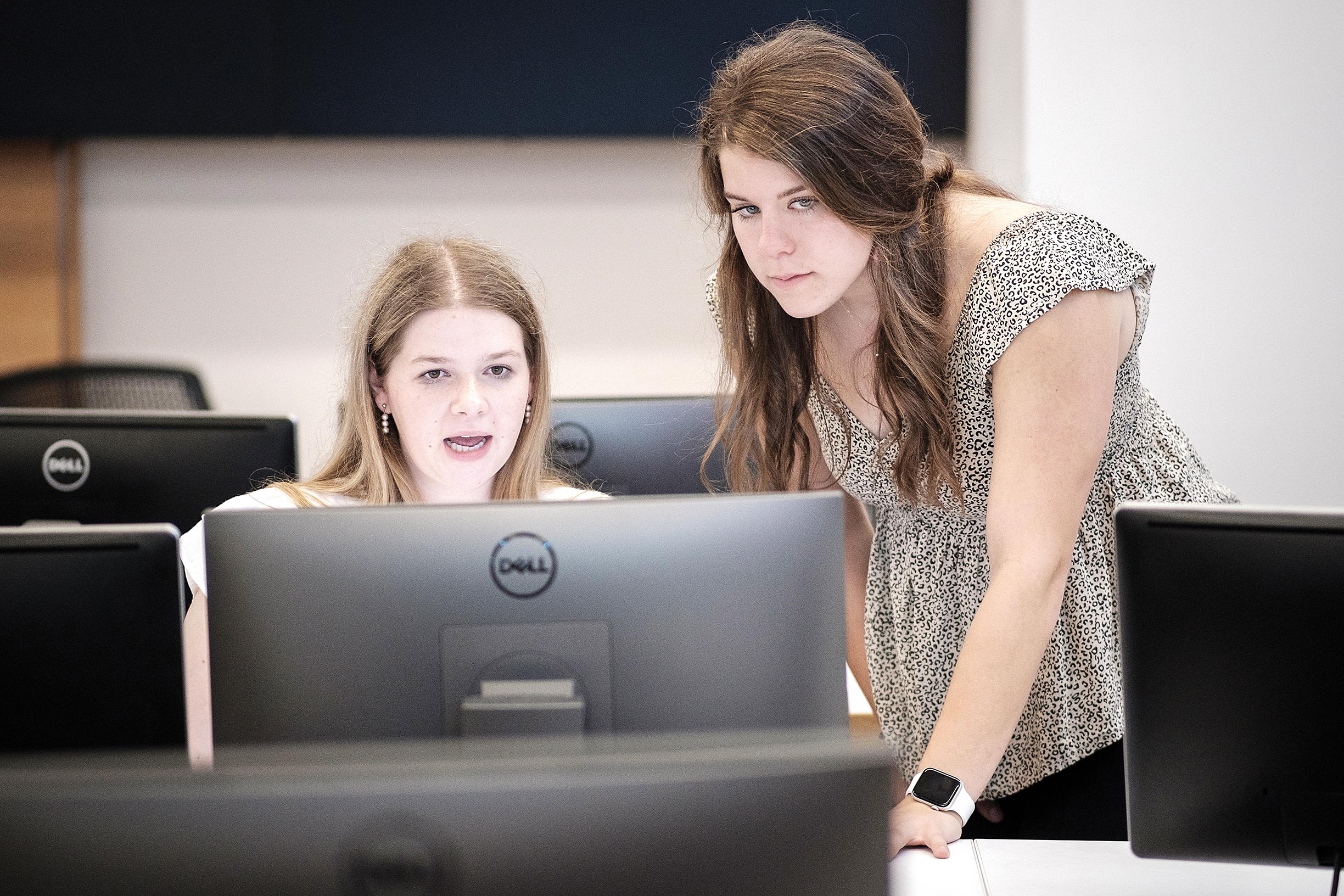School’s Rose Center for Peer Mentorship has improved retention and engagement while forming bonds between freshmen, alumni and underclassmen that stretch beyond campus
When asked to choose her major, Callie Houck didn’t have any specific goals or career in mind when she chose “business” entering her first year at Campbell University. In fact, she picked business because it meant options after graduation. But ask Houck today what she wants to be in the next five or 10 years, and her answer is clear.
She wants to be Rebekah Cheney.
And, really, who doesn’t? Since earning her trust degree and MBA from Campbell’s Lundy-Fetterman School of Business in 2013, Cheney has combined her business acumen with her desire to serve, working the past decade in philanthropic trust management, nonprofit funding management and higher education advancement in Louisiana, Tennessee and back in her home state of North Carolina. And she’s found time to give back by serving as an alumni mentor in the business school’s Peer Mentor Program, which has connected her with several bright, young students who can benefit from both her professional experience and her time as a Camel.

It’s the program that led her to Houck. The pairing was nothing short of “magical,” according to the junior from tiny Manchester, Maryland. Houck found someone in Cheney she not only clicked with immediately, but someone who truly wanted to see her succeed and pour all she had into the mentor role.
“Like Rebekah, I’m a big people person,” Houck says. “I just love connecting with people. So I see her career and how she connects with others, and I just know I also want to find a community, serve and fill a need … I just want to help people. I don’t know what that looks like in my career just yet, but I know I want to serve.
“So when I say Rebekah is who I want to be in 10 years, I just see the type of person she is, the wisdom and the authenticity she carries and the way she approaches every situation and every person in just the most genuine way. Meeting her, getting to know her and being her friend has just been a blessing.”
It may sound magical, but these successful mentor pairings — the ones that go beyond a semester or an academic year — are the norm in the business school’s program. Launched in 2009, the program was initially the cornerstone of the school’s inaugural on-campus first-year seminar, a freshman course designed to introduce new students to college life and provide encouragement and support. Upperclassmen played the role of mentors, and in 2015, the curriculum began to evolve to include professional development and leadership training. In 2019, a decade after the launch, the school began inviting alumni mentors to take part.
“I feel like the business school here offers a more holistic program. The education is more than just products and profit; it’s really about purpose,” says Renee Green, director of student success and leadership development for the School of Business. “That’s my passion — growing each person professionally — but you can’t be a strong professional without also being a strong person. I think our faculty are trained to provide knowledge to our students, but these alumni mentors really help in applying what is learned in the classroom. It’s valuable to the overall education our students receive here.”
Each student who begins in the business school takes on a mentor, and the statistics suggest the program is working. According to a recent survey of those who’ve had a peer mentor, 70 percent say they feel “strongly connected” to the school and the business community because of it. Nearly 90 percent say the program helped them grow personally and become more aware, and all of the mentors who’ve taken part have reported a positive impact on their “sense of community and collaboration.”
More importantly, school officials say the program has played a big role in its strong retention rate (over 80 percent, compared to the national rate of 67 percent). Dean Dr. Kevin O’Mara and Green have presented the success of the program at the University of New Mexico’s Mentoring Institute and at International Mentoring Association conferences.
“It is very rare that a program can impact every single student in a business school in such a memorable way and at such an early stage in a student’s college career,” O’Mara says.
In September, the school announced the establishment and naming of the Rose Center for Peer Mentorship after a generous donation from Meredith and Chandler Rose, the team behind the Rosewood Family of Companies in Raleigh, which provides a full suite of construction, installation, project management and staffing services all over the country. For Meredith Rose, a member of Campbell University’s Board of Trustees, associating with the program aligns with the company’s vision of “multiplying blessings” and providing a work environment that encourages professional growth and a “spirit of excellence.”
“We all have something to give, whether it is words, time, knowledge, money or even your influence,” she says. “By giving, you are opening the doors for a young student to have access to new opportunities, to new insights, to learning and to grow and develop themselves. We believe the Rose Center for Peer Mentorship does just this. These mentors take their time, their experience, their knowledge and their connections and share them with the new first-year students to give them the chance to have the most fulfilling first year as possible. What a way to multiply your blessings.”

It’s easy for anybody — especially when they’re younger and figuring out what direction they’re heading — to think of themselves as the “lead character” in the movie that is their life.
Choosing to also take on a supporting role in someone else’s journey takes a little more effort, says Cheney.
“So now Callie is the lead character, so how do I support her? How can I encourage her? What advice can I give her? What if I’m not the right person at this point in her life?” she says. “I can’t tell you how many times I’ve told Callie, ‘I just want to be meaningful to you.’ I just want to make sure what I’m giving her is what she wants and needs out of this mentor relationship.”
There are three reasons Cheney says she got involved in the Peer Mentor Program. First, she loves Campbell. Second, she loves the School of Business. And third, she loves people. She thinks back to her BADM course as a freshman and the Gallup Clifton Strengths assessment test she took that labeled her a “developer.” Gallup defines developers as “exceptionally talented [at] recognizing and cultivating potential in others.”
A few years ago, after moving back to North Carolina to take the director of annual giving role at Western Carolina University, Cheney decided to accept that “developer” role and take part in the mentor program at her alma mater.
“I take Campbell’s mission of servant leadership very seriously,” she says. “I just think that’s a very beautiful way to live. So when Renee approached me about this opportunity it seemed like a great fit, not only because of my love of Campbell, but to follow that path to become more of who I naturally am.”
If a program like this sticks around long enough, it begins to have a generational impact. Sophomore Gillian Kitchings of Goldston chose accounting for her major because she loves math and liked what she saw in the business school when visiting campus as a high school student. When she learned this major meant she would have a mentor in her first semester, she didn’t know what to expect.
“I met Callie through email first, and immediately, I thought, ‘This girl is going to be a fantastic help to me,’” Kitchings says. “We just clicked right away, and I can say that a year later, we’re still very close. I go to her about a lot of things, and I’ve realized along the way that this is what business school is all about. This is the kind of networking experience that I’m going to have after I graduate. Making those connections now has made me realize that I’m in the right place, and this is what I’m here for.”

Houck became Kitchings’ mentor, taking a lot of what she learned from Cheney and passing it on to her. The new students aren’t the only ones benefiting from this model — Cheney says she is growing because of her supporting role, and students like Houck and Kitchings are learning valuable leadership lessons serving as guides for incoming students.
“Rebekah’s taught me that everybody’s different, and there are different ways to connect to different people,” Houck says. “In this program, I’ll get five or six freshmen, and they’re all unique. Maybe one is an athlete, and another is an international student. Maybe I have someone who lives 10 minutes from campus and another from out of state. I need to find ways to connect with each of them on a personal level, and I’ll need to use these skills in my career, too.”
A survey of School of Business freshmen in 2021 found that 95 percent of them were positively impacted by the peer mentor in the areas of offering encouragement, supporting the college transition, offering relevant feedback and offering overall support. Nine out of 10 students said they benefited from group discussions, help in navigating their academic process and taking part in a group project.
Last September, 83 percent of students said they felt “connected” to their peer mentor.
“Callie has opened so many doors for me and has helped me realize how many things I can be involved in here,” Kitchings says. “She showed me I can make a name for myself at Campbell and make a difference. It’s just wonderful to have people like her and Rebekah pouring so much into this program. Knowing them and learning from them is the reason I decided to become a mentor, too.”
“It’s a joy seeing these students get the support they’re getting,” adds Cheney. “Because it’s hard being a student and even harder being a young professional. It was hard for me, and I had a great network. But it wasn’t like this. It was nothing like this.”

